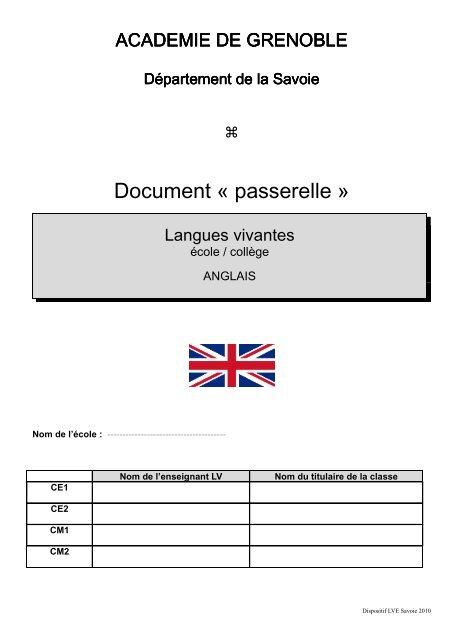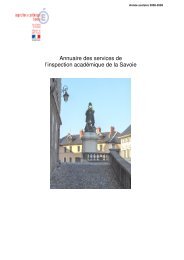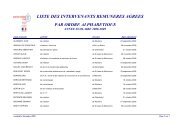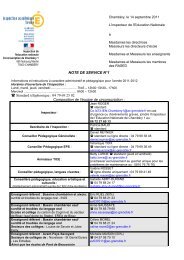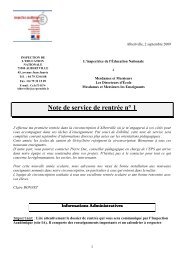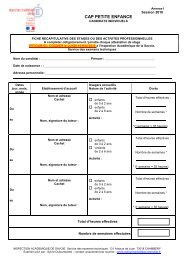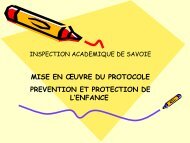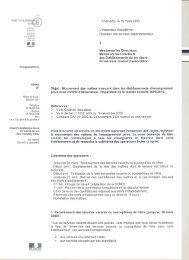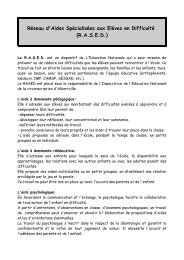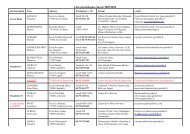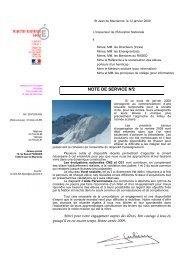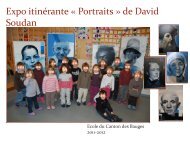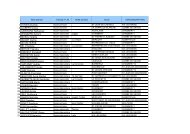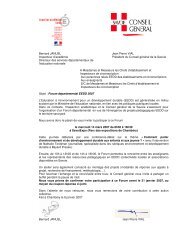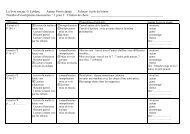anglais - Inspection académique de la Savoie
anglais - Inspection académique de la Savoie
anglais - Inspection académique de la Savoie
Create successful ePaper yourself
Turn your PDF publications into a flip-book with our unique Google optimized e-Paper software.
ACADEMIE DE GRENOBLE<br />
Département <strong>de</strong> <strong>la</strong> <strong>Savoie</strong><br />
<br />
Document « passerelle »<br />
Langues vivantes<br />
école / collège<br />
ANGLAIS<br />
Nom <strong>de</strong> l’école : ---------------------------------------<br />
CE1<br />
CE2<br />
CM1<br />
CM2<br />
Nom <strong>de</strong> l’enseignant LV<br />
Nom du titu<strong>la</strong>ire <strong>de</strong> <strong>la</strong> c<strong>la</strong>sse<br />
Dispositif LVE <strong>Savoie</strong> 2010
Fiche d’accompagnement du « Document Passerelle »<br />
Le document-passerelle est renseigné par le maître ou l’enseignant en <strong>la</strong>ngue. Un exemp<strong>la</strong>ire par<br />
niveau <strong>de</strong>vra être rempli dans chaque c<strong>la</strong>sse et transmis en fin d’année sco<strong>la</strong>ire au collègue <strong>de</strong> <strong>la</strong><br />
c<strong>la</strong>sse supérieure ou aux principaux <strong>de</strong>s collèges <strong>de</strong> secteur. Ce document <strong>de</strong>vrait permettre <strong>de</strong><br />
renforcer <strong>la</strong> cohérence <strong>de</strong>s apprentissages sur l’ensemble du cursus sco<strong>la</strong>ire.<br />
Le « document passerelle » comprend 3 parties :<br />
A - Une programmation<br />
Cette programmation a été é<strong>la</strong>borée dans le but d’ai<strong>de</strong>r l’enseignant en <strong>la</strong>ngue à répartir les<br />
contenus linguistiques par niveau (I.O. 2008). Les fonctions <strong>la</strong>ngagières sont présentées <strong>de</strong> façon<br />
linéaire mais il ne s’agit pas d’une progression. Elles ne seront pas étudiées dans l’ordre indiqué :<br />
chaque enseignant pourra construire lui-même sa progression en fonction <strong>de</strong> ses besoins ou <strong>de</strong><br />
ses projets. L’enseignant <strong>de</strong> <strong>la</strong>ngue s’appuiera sur ces contenus linguistiques pour développer les<br />
5 compétences définies par le Cadre Européen Commun <strong>de</strong> Référence pour les Langues.<br />
B - Le contenu lexical<br />
Chaque enseignant pourra puiser dans les listes proposées le lexique qui l’ai<strong>de</strong>ra à mener ses<br />
séances. Il surlignera au fur et à mesure le lexique acquis.<br />
C - Contenus culturels<br />
L’enseignant remplira les différentes rubriques avec le souci <strong>de</strong> <strong>la</strong>isser à ses successeurs une<br />
trace <strong>de</strong>s supports utilisés et <strong>de</strong>s thèmes culturels abordés.<br />
Si un élève est amené à quitter l’établissement en cours <strong>de</strong> cycle, l’enseignant pensera à lui<br />
remettre un exemp<strong>la</strong>ire surligné à cet élève pour son nouvel établissement.<br />
A - PROGRAMMATION<br />
Fonctions<br />
<strong>la</strong>ngagières<br />
CE1 CE2 CM1 CM2<br />
Se présenter<br />
- donner son nom<br />
- donner son âge<br />
- donner sa date<br />
d’anniversaire<br />
- dire où l’on habite<br />
- dire d’où l’on vient<br />
I’m Mary/Marie<br />
I’m five<br />
I live in<br />
My name’s Peter<br />
I’m five and a half<br />
I come from France + pays<br />
anglophones<br />
My phone number is….<br />
I’m nine years old<br />
My birthday is in May/ on<br />
the 6 th of May.<br />
+ pays d’Europe<br />
+ pays d’Europe<br />
- indiquer sa nationalité<br />
- donner son numéro <strong>de</strong><br />
téléphone<br />
- présenter sa famille<br />
- se décrire<br />
This is my….Mum / Dad<br />
I’m French<br />
This my Mummy,<br />
Daddy, sister, brother,<br />
I’ve got blue eyes<br />
I’ve got a sister/ two brothers,<br />
half brothers, half sisters<br />
I’ve got big blue eyes<br />
I’ve got… His/ Her name is<br />
My eyes are blue<br />
Deman<strong>de</strong>r <strong>de</strong>s<br />
informations à quelqu’un<br />
- nom<br />
- état général<br />
- âge<br />
- adresse<br />
- téléphone<br />
What’s your name <br />
How are you <br />
How old are you<br />
(compréh)<br />
Where do you live<br />
What about you<br />
Do you live in a house or a<br />
f<strong>la</strong>t<br />
What’s your phone number<br />
Have you got pets<br />
Who are you (dans les<br />
jeux <strong>de</strong> rôle)<br />
Are you all right/ tired <br />
When is your birthday<br />
Do you live in country/<br />
town<br />
Where do you come from<br />
Dispositif LVE <strong>Savoie</strong> 2010
- possession<br />
- famille<br />
- goûts<br />
- sur ce qu’il veut<br />
- sur ce qu’il sait faire<br />
Have you got a cat<br />
Do you like + (couleurs,<br />
nourriture) <br />
(Compréh.)<br />
Do you like (something)<br />
What do you like I like/ I<br />
don’t like…<br />
What’s your favourite….<br />
Do you want a fish<br />
What do you want<br />
Can you swim<br />
What’s your sister’s/<br />
brother’s name (compréh)<br />
Do you like + V…ing…<br />
(activités)<br />
What do you prefer<br />
Do you prefer cats or dogs<br />
Would you like (a cup of<br />
tea)<br />
What would you like<br />
Deman<strong>de</strong>r et dire à qui<br />
appartient une chose<br />
Whose coat is this<br />
(compréh)<br />
It’s (not) mine. It’s Tom’s<br />
Exprimer<br />
- état général<br />
- sentiments :<br />
<strong>la</strong> joie, l’émerveillement<br />
<strong>la</strong> tristesse<br />
<strong>la</strong> déception<br />
<strong>la</strong> peur<br />
<strong>la</strong> colère<br />
- sensations physiques<br />
<strong>la</strong> douleur<br />
<strong>la</strong> fatigue<br />
<strong>la</strong> faim/ <strong>la</strong> soif<br />
<strong>la</strong> chaleur/ le froid<br />
I am fine/ OK/<br />
I’m not very well/<br />
So-so !<br />
Great ! Super !<br />
Ouch !<br />
I’m cold/ hot<br />
I’m fairly well …<br />
Won<strong>de</strong>rful ! I’m happy<br />
I’m sad.<br />
What a pity !<br />
I’m scared !<br />
I’m angry !<br />
I’ve got a head/ stomach<br />
ache<br />
I’m tired ! I’m sleepy<br />
I’m hungry/ thirsty<br />
I’m freezing/ warm<br />
→<br />
I’m upset<br />
I’m so tired<br />
I’m too hot/ cold…..<br />
Parler <strong>de</strong> ses goûts<br />
- dire ce que l’on aime<br />
- dire ce que l’on n’aime<br />
pas<br />
- dire ce que l’on préfère<br />
- dire ce que l’on déteste<br />
II like<br />
I like choco<strong>la</strong>te./ I like dogs<br />
I don’t like cheese.<br />
I love bananas<br />
I prefer dogs.<br />
I hate beans<br />
I like skiing, swimming<br />
I like (this) but I don’t like<br />
(that)<br />
Dire ce qu l’on possè<strong>de</strong><br />
ou non<br />
I’ve got I’ve got…. I’ve got / I haven’t got (a cat/<br />
cats); I’ve got no cats.<br />
Dire<br />
que l’on sait ou que l’on ne<br />
sait pas<br />
- ce que l’on sait faire ou<br />
que l’on ne sait pas<br />
faire<br />
- que l’on ne comprend<br />
pas<br />
- que l’on a oublié<br />
I don’t know<br />
I can<br />
I know. I don’t know.<br />
I can. I can’t<br />
I don’t un<strong>de</strong>rstand.<br />
I<br />
’ve forgotten<br />
Dire ou <strong>de</strong>man<strong>de</strong>r<br />
- ce que l’on fait (actions<br />
courantes)<br />
- ce que l’on fait (en ce<br />
moment)<br />
I have breakfast/ lunch/<br />
dinner at + heures pleines et<br />
½<br />
I learn english on Monday and<br />
Thursday<br />
+ quarter past/quarter to<br />
I read/ she/he reads<br />
Do you read….<br />
Yes I do/ No I don’t<br />
What are you doing<br />
I’m (read)ing.<br />
What is she/he doing<br />
She/he’s (writ) ing.<br />
Dire ce que l’on veut<br />
I want + dét + nom (jeu <strong>de</strong><br />
<strong>la</strong> marchan<strong>de</strong>)<br />
I’d like + dét + nom<br />
→<br />
Donner un ordre<br />
(et son contraire si besoin)<br />
Stand up !/ Sit down ! … Don’t touch ! …. → à enrichir → à enrichir<br />
Re<strong>la</strong>tions sociales<br />
- se saluer/ prendre<br />
congé<br />
- donner quelque chose<br />
- répondre :<br />
*positivement<br />
Hello ! Good morning !<br />
Good afternoon ! Good<br />
night ! Good-bye !<br />
Yes !<br />
See you ! Bye-bye !<br />
Here you are !<br />
Yes, please.<br />
See you on Monday!<br />
Have a nice day!<br />
Yes, It is/yes, I have/ yes, I<br />
Nice to meet you !<br />
}→Observation <strong>de</strong> <strong>la</strong> <strong>la</strong>ngue<br />
Dispositif LVE <strong>Savoie</strong> 2010
*négativement<br />
- remercier<br />
- répondre à un<br />
remerciement<br />
- présenter ses excuses<br />
- souhaiter<br />
(anniversaire- fête)<br />
- encourager/ féliciter<br />
- exprimer son :<br />
accord<br />
<br />
<br />
désaccord<br />
jugement<br />
No !<br />
Thank you !<br />
Merry Christmas!<br />
Happy New Year! Happy<br />
birthday !<br />
Good! Excellent !<br />
No, thanks.<br />
Thanks.<br />
Sorry!<br />
Happy Easter !<br />
Happy birthday to you!<br />
Great! / Super !<br />
You’re a champion !<br />
It’s right.<br />
It’s wrong<br />
do.<br />
No, it isn’t/No, I haven’t/<br />
No, I don’t.<br />
You’re welcome.<br />
Excuse me! I’m sorry!<br />
Have a nice Holiday!<br />
Congratu<strong>la</strong>tions !<br />
It’s better. Well done !<br />
I agree .<br />
I don’t agree.<br />
<strong>ang<strong>la</strong>is</strong>e au niveau <strong>de</strong>s<br />
réponses courtes.<br />
I’m so sorry.<br />
→<br />
You’re doing very well!<br />
(compréhension).<br />
She/he’s/you’re/they’re<br />
right.<br />
She/he’s/you’re/they’re<br />
wrong.<br />
Formuler une <strong>de</strong>man<strong>de</strong><br />
polie pour obtenir :<br />
- <strong>la</strong> permission <strong>de</strong>….<br />
Can I go to the toilet, please <br />
- quelque chose<br />
- <strong>de</strong> l’ai<strong>de</strong> en général<br />
- <strong>la</strong> répétition d’un mot,<br />
d’une phrase<br />
- <strong>de</strong>s explications<br />
-<br />
Please ! Can I have…(objets) <br />
Can I have a/ an…., please<br />
Can you help me, please<br />
Can you repeat, please<br />
(He’s happy.) Why<br />
Présenter une personne,<br />
un animal ou une chose<br />
This is ( Tom/ a cat/ a<br />
tree).<br />
This is my….<br />
+ albums + contes<br />
+ albums + contes<br />
Deman<strong>de</strong>r <strong>de</strong>s<br />
informations sur quelqu’un<br />
ou qu chose<br />
What is this <br />
Is it (a cat) <br />
Is it blue or white <br />
Is this Peter<br />
Who’s this It’s Peter.<br />
What about Peter<br />
Décrire<br />
- taille<br />
I<br />
It’s big/ small<br />
It’s long/short<br />
It’s big/ he’s small/<br />
She’s tall/ she’s short.<br />
They’re fat….(compréh)<br />
- couleur<br />
- vêtements<br />
- pronoms personnels<br />
- adjectifs possessifs<br />
-<br />
What colour is it <br />
(comprehension)<br />
(6 couleurs <strong>de</strong> base)<br />
I /You/It<br />
What colour is it <br />
I/ You/ It<br />
My/ Your<br />
She’s got brown eyes.<br />
He’s got a red bike.<br />
She/he’s wearing…<br />
He/ she/ they<br />
+ couleurs complexes<br />
(spotted-stripped-multicoloured)<br />
His sweater is blue.<br />
Her shoe is/ Her<br />
are ...<br />
shoes<br />
Les nombres<br />
- connaître les nombres<br />
<strong>de</strong> 1 à 100<br />
1 to 10<br />
One to twelve<br />
One to 30<br />
1 to hundred<br />
What number is (it)…. <br />
→ 999<br />
Ordinaux jusqu’à 31 pour<br />
les dates.<br />
- dénombrer<br />
- interroger sur le prix<br />
- indiquer le prix<br />
- interroger sur <strong>la</strong><br />
quantité<br />
How many <br />
(compréhension)<br />
One cat, two cats….<br />
How many <br />
How many pens are there<br />
(comprehension)<br />
How much is it <br />
It’s …+ unité <strong>de</strong> monnaie<br />
How many ( … s) are<br />
there <br />
- préciser <strong>la</strong> quantité<br />
There is/there are…<br />
La météo<br />
- <strong>de</strong>man<strong>de</strong>r le temps qu’il<br />
fait<br />
- dire le temps qu’il fait<br />
-<br />
What’s the weather<br />
like (compréhension)<br />
It’s sunny, raining,<br />
snowing, cloudy<br />
It’s hot, cold<br />
What’s the weather like<br />
today<br />
It’s stormy, windy, freezing<br />
→<br />
→<br />
Date et heure It’s Monday… What day is it, today <br />
What’s the date, today<br />
Thursday, October 25 th<br />
What time is it<br />
It’s ten/ It’s half past ten.<br />
Yesterday was…<br />
Tomorrow will be…<br />
(comprehension)<br />
It’s ten/ quarter past to<br />
Dispositif LVE <strong>Savoie</strong> 2010
Localiser<br />
It’s in / on …<br />
(comprehension)<br />
It’s in / on / un<strong>de</strong>r ….. Where is it/ he/ she/ <br />
It/she/he’s here/ It/she/he’s<br />
over there (comprehension)<br />
It’s on/in/un<strong>de</strong>r/behind/on<br />
the left/on the right<br />
Where are they (compreh)<br />
They’re here/over there.<br />
It’s in front of/next to/<br />
between.<br />
At the top/at the bottom<br />
Quelques connecteurs Tom and Peter Tom and Peter<br />
Tea or coffee<br />
I<br />
I like tea but I prefer coffee.<br />
Because it’s (too) difficult…..<br />
B- CONTENU LEXICAL<br />
(à surligner par les enseignants <strong>de</strong> <strong>la</strong> c<strong>la</strong>sse, pour pointer ce qui est étudié)<br />
Les mots en italique ne figurent pas dans le B.O mais sont présents dans <strong>de</strong> nombreuses métho<strong>de</strong>s.<br />
Ma famille<br />
Family, parents, mother, mummy, mum, father, daddy, dad, brother, sister<br />
Grandparents, grandmother, grandma, grandfather, grandpa, aunt, uncle, cousin<br />
Les animaux<br />
Pets: cat, kitten, dog, bird, guinea pig, fish, mouse/mice, hamster,<br />
Frog, bee, <strong>la</strong>dybird, owl<br />
Farm animals: cow, duck, chicken, chick, horse, pig, sheep, rabbit, goose, donkey<br />
Wild animals: bear, crocodile, monkey, elephant, giraffe, lion, tiger, wolf, zebra,<br />
snake, kangaroo, tortoise, frog, fox, shark, camel, <strong>de</strong>er, rein<strong>de</strong>er, shell, crab<br />
Insects: spi<strong>de</strong>r, caterpil<strong>la</strong>r, bee, <strong>la</strong>dybird, grass hopper, ant, beetle<br />
Verbs: crawl, swim, jump, fly, run, creep<br />
Nourriture<br />
Fruit : apple, banana, orange, lemon, peach, plum, grapes<br />
Vegetables :potato(es), tomato(es), beans, carrot, lettuce, peas, corn, onion<br />
Food : bacon, eggs, hamburger, sausage, crisps, sandwich, meat, chicken, fish,<br />
chips, sa<strong>la</strong>d, cheese, butter, honey, soup, spaghetti, steak, rice<br />
Biscuits (UK), cookies (US), (slice of) bread, cake, choco<strong>la</strong>te, sugar, sweets, butter,<br />
jam, marme<strong>la</strong><strong>de</strong>, toast<br />
Drinks: milk, water, coffee, tea, coke, (orange) juice, lemona<strong>de</strong><br />
Adjectives: good, <strong>de</strong>licious, full, empty, favourite<br />
Verbs: have, eat, drink, taste, smell, fry, cook<br />
La maison<br />
House, gar<strong>de</strong>n, garage<br />
Rooms: hall, toilets, kitchen, living-room, dining-room, bathroom, bedroom, cel<strong>la</strong>r,<br />
garret<br />
Table, shelf/shelves, fridge, freezer, cooker, oven, cupboard, (arm)chair, sofa, TV set,<br />
bed, <strong>la</strong>mp, wardrobe, (tele)phone, tap, sink, carpet, <strong>la</strong>d<strong>de</strong>r, key, bin, washing machine<br />
Bottle, g<strong>la</strong>ss,(tea)spoon, bowl, fork, knife/knives, napkin, p<strong>la</strong>te, dish, kettle,<br />
Door, window, wall, stairs, upstairs/downstairs, step, floor, roof, fire p<strong>la</strong>ce<br />
Adjectives: <strong>la</strong>rge, comfortable, small, big, clean, dirty<br />
Verbs: cook, clean, wash, prepare, switch on / off…<br />
Le corps<br />
Head, hair, face, eyes, ears, mouth, nose, tooth/teeth , cheeks,<br />
Body, neck, shoul<strong>de</strong>rs, arms, hands, fingers, thumb, legs, knees, foot/feet, toes, tail<br />
Verbs: shake, stamp, tap, c<strong>la</strong>p, touch, show, <strong>la</strong>ugh, smile, cry, wave, wiggle<br />
Adjectives: nice, blond/ fair hair, hairy, bald<br />
Les vêtements<br />
Clothes, pullover/ jumper, T-shirt, shirt, sweater, anorak, (rain)coat, jacket, ski suit<br />
jeans, trousers, shorts, dress, skirt, track suit<br />
Socks, shoes, boots, trainers, slippers, ski boots<br />
(sun)g<strong>la</strong>sses, scarf, gloves, mittens, cap, hat, helmet<br />
Verbs: put on, take off, wear, have got<br />
Dispositif LVE <strong>Savoie</strong> 2010
Les formes<br />
géométriques<br />
Les couleurs<br />
Circle, square, rectangle, triangle, diamond<br />
White, b<strong>la</strong>ck, yellow, orange, pink, red, blue, green, grey, brown, purple<br />
Dark, light, multi coloured, spotted, striped<br />
Descriptions<br />
Adjectives: Big, <strong>la</strong>rge, long, tall, fat, medium, small, little, thin, short, strong, weak,<br />
heavy, light, nice, beautiful, charming, handsome, pretty, ugly, young, old, scary<br />
Verbs: be, have got, look<br />
Les nombres<br />
Les ordinaux<br />
One to ten, eleven to twenty, thirty, forty, fifty, sixty, seventy, eighty, ninety, One<br />
hundred, one hundred and twenty-seven [...] Nine hundred and ninety-nine.<br />
First/1 st , second/2 nd , third/3 rd , fourth/4 th , thirty-first/31 st<br />
Verbs: count, add, multiply… by, subtract, divi<strong>de</strong> …by<br />
La journée<br />
Les rythmes<br />
quotidiens<br />
Day, night, morning, afternoon, evening<br />
Every day, today, tomorrow, yesterday, now, again<br />
Breakfast, brunch, lunch (it’s lunch time) tea, dinner<br />
Clock, watch, a.m, p.m, time<br />
Verbs: wake up/get up, brush (my teeth), have (breakfast…a shower..), go to, sleep,<br />
stop, It’s time for/to<br />
L’école<br />
Stu<strong>de</strong>nt, teacher, alphabet, spelling, first letter<br />
P<strong>la</strong>ces: c<strong>la</strong>ssroom, schoolyard/p<strong>la</strong>yground, dining hall, library,<br />
Uniform, time table, subject<br />
Maths, literature, geography, history, foreign <strong>la</strong>nguage, science, sports, arts, music,<br />
drawing, handicrafts<br />
Break/recess, pack lunch, holidays<br />
La c<strong>la</strong>sse<br />
School bag, pencil case, book, copy book, page, pencil, pen, felt pen, crayon,<br />
rubber (UK), eraser (US) , ruler, glue, (a pair of) scissors, a pencil sharpener, paper,<br />
computer, bin, dictionary, board, <strong>de</strong>sk, picture, poster<br />
Verbs for tasks: take, hold on, put, open, give, stick, cut, fold, close, colour, match,<br />
choose, tick, collect, circle, <strong>de</strong>corate, ask, answer<br />
Verbs for actions: Sit down, stand up, look, listen, repeat, write, come (here, in),<br />
say, wait, open, shut, watch, spell, pick up, learn, hi<strong>de</strong>, go and…<br />
Les sentiments<br />
Les sensations<br />
La volonté<br />
Adjectives: Great, super, nice, right, wrong, funny, won<strong>de</strong>rful, easy, difficult,<br />
ridiculous, awful, happy, fine, well, so-so, sad, tired, sleepy, scared, angry, hungry,<br />
thirsty<br />
Verbs: like/don’t like, prefer, hate, think, (I)’d like, want, smile, cry, dream,<br />
Les salutations<br />
et autres<br />
usages <strong>de</strong><br />
civilités<br />
La météo<br />
Hi !, Hello, how do you do, good morning, good afternoon, good evening, good<br />
night, welcome<br />
Please, thank you, thanks a lot, here you are/ you’re welcome<br />
Telephone: un chiffre à <strong>la</strong> fois avec (ex: 00→ double 0 ou zero)<br />
Weather, cold, warm, cool, hot, sunny, rainy(ing), windy, snowy(ing), stormy, foggy,<br />
freezy(ing) [attention: it’s raining mais it’s a rainy day.]<br />
Sky, sun, cloud, rain, snow, wind, storm, fog, rainbow<br />
La ville<br />
London, Manchester, Edinburgh, Belfast, Dublin , New York, Washington, Sydney,<br />
Madrid, Berlin, …..<br />
Town, city, vil<strong>la</strong>ge, street, roads, avenue, pavement, traffic lights, bridge<br />
School, shops, supermarket, restaurant, cinema, hotel, park, station<br />
Dispositif LVE <strong>Savoie</strong> 2010
Verbs: cross, go straight on, turn (left/right)<br />
Locating: up, down, in front of, between, next to, opposite, left, right, south, north,<br />
west, east, on top of.., across the road<br />
L’habitat<br />
f<strong>la</strong>t (UK), apartment (US), cottage, building, castle, pa<strong>la</strong>ce, tower, farm<br />
Animals: barn, nest<br />
Verbs: to be from…., to live in …<br />
La nature<br />
Flower, tree, grass, bush, sea, ocean, river, mountain, country, rock, forest, jungle, hill,<br />
<strong>de</strong>sert<br />
Verbs: grow, blow<br />
Les pays<br />
United Kingdom, America, United States, Ire<strong>la</strong>nd, France, Australia, Spain,<br />
Germany…..<br />
Eng<strong>la</strong>nd, Ulster, Scot<strong>la</strong>nd, Wales<br />
American, British, English, Irish, Scottish, French, Spanish, German, …<br />
Le calendrier<br />
Days, week: Monday, Tuesday, Wednesday, Thursday, Friday, Saturday, Sunday<br />
Months: January, February, March, April, May, June, July, August, September,<br />
October, November, December<br />
Seasons: Autumn (UK), fall (US), winter, spring, summer<br />
Les sports<br />
Football/soccer, basketball, rugby, tennis, ski, baseball, cricket, curling, swimming,<br />
frisbee, horse riding, cycling, ice skating, ballet dance…<br />
Verbs: to p<strong>la</strong>y (+ sports) , run, walk, slow down, jump<br />
Adjectives: Quick/quicker/ quickly, fast/faster, slow/slowly<br />
Les jouets<br />
Les loisirs<br />
Les jeux<br />
Cinéma,<br />
littérature,<br />
musique,<br />
peinture<br />
Contes et<br />
légen<strong>de</strong>s<br />
Les métiers<br />
Ball, balloon, racket, teddy bear, doll, robot, bike, train, toy, (computer, vi<strong>de</strong>o) game,<br />
kite, p<strong>la</strong>ne, roller skates, skate board, cards, tape recor<strong>de</strong>r, camera…<br />
Flute, drum, piano, guitar, violin, xylophone, choir,<br />
Theater, cinema, park, zoo, museum, swimming pool, ice rink,<br />
Verbs: dance, sing, p<strong>la</strong>y +(the….), paint, read, listen to the music<br />
Hopscotch, skipping rope, blindman’s –buff…<br />
Dice, board game, mask, hole, piece, card game….<br />
Film/movie ( comedy, horror, science fiction, adventure, cartoon, western), picture,<br />
painting, documentary, programme, music, song<br />
Actor, writer, musician, singer, painter / famous, favourite<br />
Witch, fairy, wizard, king, queen, knight, prince, princess<br />
Story, fairy tale, drama<br />
Teacher, the Head, farmer, doctor, nurse, fireman, policeman/bobby, pilot, vet,<br />
lollipop man/<strong>la</strong>dy, lorry driver, shop keeper, baker’s, chemist’s<br />
Les transports<br />
Car, bus, double <strong>de</strong>cker, taxi/cab, lorry (UK) truck (US), helicopter, ship, boat, bicycle,<br />
hovercraft, motorbike, wheels, wings<br />
Les personnes<br />
Boy, girl, baby, friend, man/men, woman/women, child/ children, Miss, Sir, Mr…,<br />
Mrs…, Ms…people, Queen, King, Prime Minister, Presi<strong>de</strong>nt<br />
Adjectives: old, young, ugly, handsome, pretty<br />
Dispositif LVE <strong>Savoie</strong> 2010
C – CONTENUS CULTURELS ET SUPPORTS UTILISES<br />
Pays anglophones<br />
Ex: United Kingdom, Ire<strong>la</strong>nd, New Zea<strong>la</strong>nd, United States, Australia, Canada, …<br />
F<strong>la</strong>gs:<br />
Nationalities:<br />
Institutions:<br />
Une ville<br />
anglophone et ses<br />
caractéristiques<br />
Ex: London : typical monuments: Buckingham Pa<strong>la</strong>ce, Tower Bridge….<br />
Mo<strong>de</strong>s <strong>de</strong> vie Rythme <strong>de</strong> <strong>la</strong> journée :<br />
Repas <strong>de</strong> fête :<br />
Nom <strong>de</strong> p<strong>la</strong>ts :<br />
Expressions spécifiques: ex: Here you are! / you’re welcome!<br />
Onomatopées: (ouch!)<br />
Environnement<br />
urbain et<br />
géographique<br />
Environnement et<br />
personnages<br />
historiques<br />
Habitat : (ex : <strong>de</strong>tached and semi-<strong>de</strong>tached houses)<br />
Conduite à gauche : (ex :United-Kingdom, Australia)<br />
Conduite à droite : (ex :U.S.A)<br />
Eléments extérieurs : (ex : red phone box)<br />
Moyens <strong>de</strong> transport : (ex : double <strong>de</strong>cker bus)<br />
Fleuves : (ex : river Thames, Mississippi river)<br />
Personnages célèbres : (ex : Queen Elizabeth, Guy Fawkes….)<br />
Evénements historiques : First Pilgrims on eastern coast of America<br />
Fêtes Ex :<br />
Birthday:<br />
Comptines Titres :<br />
Halloween:<br />
Guy Fawkes’s night:<br />
Thanksgiving (US) :<br />
Christmas:<br />
Martin Luther King’s day (US):<br />
Valentine’s day:<br />
St Patrick’s day (Ire<strong>la</strong>nd):<br />
April’s Fool’s day:<br />
Easter:<br />
In<strong>de</strong>pen<strong>de</strong>nce Day (US):<br />
Albums Titres :<br />
Chansons<br />
Titres<br />
Dispositif LVE <strong>Savoie</strong> 2010


